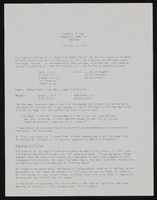Search the Special Collections and Archives Portal
Search Results
Babe Pier Papers
Identifier
Abstract
The Babe Pier Papers (approximately 1962-2012) include promotional materials, photographs, and audiovisual materials documenting the career of Las Vegas, Nevada-based comedian and impressionist, Babe Pier. Materials include Pier's show reels, fliers, posters, and photographs of Pier as a solo entertainer and as part of comedy groups such as the Vagabonds and the Happy Jesters. The collection includes recordings of Pier's appearances on television shows like the Mike Douglas Show and Milton Berle's comedy special as well as his comedic boxing charity fights. Materials also contain personal photographs of Pier and his family, including his wife, Cindy Raft, who managed an entertainment agency and was also an entertainer in Las Vegas.
Archival Collection
Nevada Consolidated Copper Company Records
Identifier
Abstract
The Nevada Consolidated Copper Company Records (approximately 1907-1978) contain the business records of the company, including correspondence, freight bills, ledgers, maps, leaching data, and books relating to mining. The majority of the records post-date the company's name change to Kennecott Mining Company.
Archival Collection
Charles P. and Delphine Squires Papers
Identifier
Abstract
The Charles P. and Delphine Squires Papers from 1882 to 1964, with bulk dates from 1905 to 1964, contain book and short story manuscripts, articles, press releases, newspaper clippings, and radio scripts written by Squires and his wife, all relating to their early life in Las Vegas. Also included are report cards, certificates, Parent Teacher Association material, Mesquite Club records and church activity materials.
Archival Collection
Nevada Test Site Oral History Project Records
Identifier
Abstract
The Nevada Test Site Oral History Project Records (approximately 1950-2008) consist of oral histories collected by University of Nevada, Las Vegas Department of History for the Nevada Test Site Oral History Project. The collection includes digital audio recordings of interviews, print and digital transcripts, and a small selection of digital video recordings. Some interviews have also been supplemented with photographs, letters, scientific articles, brochures, news clippings and ephemera about the Nevada Test Site.
Archival Collection
Thomas Clark Professional Papers
Identifier
Abstract
The Thomas Clark Professional Papers (1950-1998) contain materials from his tenure as a Professor of English at the University of Nevada, Las Vegas (UNLV), which are divided into two series. The gaming research series includes newspaper clippings, correspondence, brochures, bulletins and articles. Also included are book chapters, a glossary of terms used in the casino industry, and gambling guides. In the linguistics and teaching series there are research files, articles, speeches, correspondence, interviews, multimedia, workshops, and conference materials. Also included are files on graffiti, symbolism, ethnic and regional speech differences, language usage, and National Council of Teachers of English (NCTE) material. Additional materials include colleague publications and cassette tapes of interviews from students in courses Clark taught at UNLV.
Archival Collection
Station Casinos Publicity Collection
Identifier
Abstract
The Station Casinos Publicity Collection (1995-2013) contains magazine articles, newsclippings, and photographs about various Station Casinos properties in Las Vegas, Nevada. A transition report published by Station Casinos in 1998 is also included.
Archival Collection

Economic Opportunity Board of Clark County (Nev.): memos, agendas, and meeting minutes
Date
Archival Collection
Description
From the Clark County Economic Opportunity Board Records -- Series I. Administrative. This folder contains memos, agendas, and minutes from meetings of the Clark County Economic Opportunity Board from February 1971 through January 1973.
Text

Transcript of interview with Gil Cohen by Claytee White, August 5, 2014
Date
Archival Collection
Description
Interview with Gil Cohen by Claytee White on August 5, 2015. In this interview, Cohen discusses growing up in Las Vegas and attending University of Nevada at Reno. He returned to Las Vegas to join the management training program at the Stardust. He talks about his friendships with Moe Dalitz and Carl Cohen, and his interest in golfing. He also discusses corporate ownership of casinos, unions, and his experiences working at different Strip hotels.
Gil Cohen came to Las Vegas in 1957, when was ten years old, when his father, Yale Cohen, was recruited by Moe Dalitz to work at the Stardust Hotel and Casino. Cohen graduated from University of Nevada Reno, and started working at the Stardust through the management-training program. In 1975, he was made hotel manager, his first of many leadership positions in Strip properties, which have included the Dunes, Aladdin, Hacienda and Monte Carlo, where he currently works as a casino host.
Text

Larry Mason interview, September 14, 2018: transcript
Date
Archival Collection
Description
Interviewed by Nathalie Martinez. Larry Mason is an Arizona native that moved to Las Vegas as a Higher Education Administrator. He was born in Tuscon, Arizona, but grew up mostly in East Los Angeles and his "Gramitas" ranch in Sonora, Mexico. He has a history in athletics as a basketball player in his upbringing which brought him to play at the New Mexico Highlands University and the European League. Earning a Masters in Education, Larry Mason came to Las Vegas to become the first Latino Director of Admissions at UNLV, first Latino President of the Board of Education, and first Latino Vice President of the Board of Education in the Clark County School District. He launched an incredible amount of movements within the educational field in Las Vegas including (but not limited to): the Mariachi program, the magnet school program, and the growth of the Diversity Division within the NSHE. Some of his greatest supporters and allies included Senator Harry Reid, John Lujan and Tom Rodriguez. Mason continues to work as a community leader for minority representation in STEM fields, as a board member for the Nevada STEM Coalition.
Text

